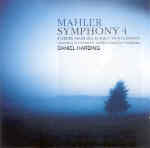I fell asleep twice trying to get through this sterile, benumbed performance of Mahler’s Fourth Symphony, and the bottom line is that the Mahler Chamber Orchestra (at least under Daniel Harding) has no business playing it. However interesting using such small forces may sound in theory, it’s a non-starter in practice. The lack of heft to the string tone makes such Romantic effusions as the first movement’s second subject, or the passionate climaxes of the Adagio, sound thin and undernourished, often to the point of parody (remember the Dolmetsch early music ensemble playing Tchaikovsky’s 1812 Overture on one of those Hoffnung Festival albums?). Nor do the chamber forces increase to any significant degree the clarity of Mahler’s already translucent textures. To take just one example, the three unison clarinets (mezzo-piano) against the (piano) lower strings after measure 45 in the first movement are far more audible from Kubelik on DG than here.
But beyond that, the playing betrays little understanding of an idiomatic Mahlerian style. Harding is very attentive to dynamics at the lower end of the scale, but aside from the lack of a true fortissimo anywhere, the players are afraid to make any sound that isn’t blandly smooth. The famous passage for four unison flutes in the first movement has no edge, the trumpeting clarinets in the trio of the scherzo are far too well behaved, and the cymbals at the first movement climax are simply too tame. You never would guess that the solo violin in the scherzo is playing a mistuned instrument: he’s merely puny and pretty, exactly the opposite of what the music requires. Harding’s tempos are average in the first too movements, but notably slow in the last two. The Adagio drags on interminably, and the humorous accelerating variations before the big climax fail to accelerate: Harding gets moving too quickly, too early. When the “gates of heaven” climax arrives, the lack of support from the strings makes it sound about as transcendent as a Sousa march.
Adding insult to injury, Dorothea Röschmann, a soprano I usually admire in performances of Baroque music, sounds miscast in the finale. Her voice is wobbly on top, unsupported on the bottom, and although she does some wonderful things with the text (particularly in the third stanza), she can’t overcome the pervasive feeling of discomfort. She’s much better in the two quick Wunderhorn songs, which give her a chance to show off her vivid feeling for the German language–but “Wo die schönen Trompeten blasen” has much of the same problems of timbre and steadiness as the finale of the symphony. Curiously, in “Lob des hohen Verstandes” the woodwinds have all of the character they so studiously avoid everywhere else, leading me to think that blame for this fiasco must rest with Harding, whose recordings to date hardly justify the reputation he is garnering. Certainly his Beethoven and Brahms reveal similar failings. In sum, this is hugely disappointing, an experiment gone wrong.
































